|
|
|
Sort Order |
|
|
|
Items / Page
|
|
|
|
|
|
|
| Srl | Item |
| 1 |
ID:
165752
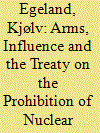

|
|
|
|
|
| Summary/Abstract |
The TPNW challenges the legitimacy of nuclear deterrence, but it would not eliminate deterrence in practice.
|
|
|
|
|
|
|
|
|
|
|
|
|
|
|
|
| 2 |
ID:
157929
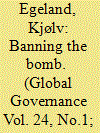

|
|
|
|
|
| Summary/Abstract |
Kjølv Egeland focuses on the dynamics of multilateral disarmament diplomacy and international security. He has contributed commentary and research articles inter alia to the Bulletin of the Atomic Scientists, the Nordic Journal of International Law, Peace Review, New Internationalist, European Leadership Network, and several Norwegian dailies.
|
|
|
|
|
|
|
|
|
|
|
|
|
|
|
|
| 3 |
ID:
185831
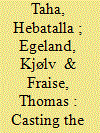

|
|
|
|
|
| Summary/Abstract |
Looming decisions on arms control and strategic weapon procurements in a range of nuclear-armed states are set to shape the international security environment for decades to come. In this context, it is crucial to understand the concepts, theories, and debates that condition nuclear policymaking. This review essay dissects the four editions of The Evolution of Nuclear Strategy, the authoritative intellectual history of its subject. Using this widely acclaimed work as a looking glass into the broader field of nuclear security studies, we interrogate the field's underlying assumptions and question the correspondence between theory and practice in the realm of nuclear policy. The study of nuclear strategy, we maintain, remains largely committed to an interpretive approach that invites analysts to search for universal axioms and to abstract strategic arguments from the precise circumstances of their occurrence. While this approach is useful for analysing the locutionary dimension of strategic debates, it risks obscuring the power structures, vested interests, and illocutionary forces shaping nuclear discourse. In the conclusion, we lay out avenues for future scholarship.
|
|
|
|
|
|
|
|
|
|
|
|
|
|
|
|
| 4 |
ID:
144392
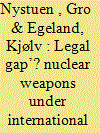

|
|
|
|
|
| Summary/Abstract |
Over the past five years, the international community has devoted attention to the humanitarian, environmental, and developmental consequences of nuclear weapons detonations
|
|
|
|
|
|
|
|
|
|
|
|
|
|
|
|
| 5 |
ID:
187316
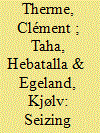

|
|
|
|
|
| Summary/Abstract |
In this article, we interrogate some of the central assumptions in the literature on Iran's nuclear behavior, including the role of the United States as a benevolent hegemon, the revisionist character of the Iranian government, the utility and efficacy of sanctions, and the widespread assumption that Iran is bent on obtaining and even using the bomb. We maintain that contemporary debates on the Iranian nuclear issue display similarities to Kremlinology during the Cold War, being deeply politicized and subject to bias and self-censorship. We conclude by highlighting ways for scholars to recast the discussion.
|
|
|
|
|
|
|
|
|
|
|
|
|
|
|
|
| 6 |
ID:
170992
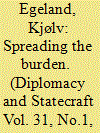

|
|
|
|
|
| Summary/Abstract |
Common knowledge has it that the end of the Cold War allowed the North Atlantic Treaty Organization (NATO) to push the nuclear genie back into the bottle. But whilst NATO members have reduced the alliance’s practical, military reliance on nuclear arms, their commitment to nuclear defence as a shared, symbolic enterprise has in fact grown increasingly explicit over time, with NATO declaring itself a ‘nuclear alliance’ in 2010. The following analysis develops two arguments. First, political responsibility for nuclear defence has shifted from individual member-states to the alliance as such; and, second, this development has been fuelled by member-states’ recurrent need to deflect criticism and adapt to the strengthening of humanitarian and anti-nuclear norms. The pulverisation of responsibility for nuclear defence in NATO has enabled pro-nuclear actors to justify costly nuclear modernisation programmes as acts of ‘alliance solidarity’ whilst exercising rhetorical coercion over advocates of denuclearisation.
|
|
|
|
|
|
|
|
|
|
|
|
|
|
|
|
| 7 |
ID:
192022
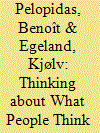

|
|
|
|
|
| Summary/Abstract |
What do people really think about nuclear weapons? Responding to Dill, Sagan, and Valentino's “Kettles of Hawks” in Security Studies 31, we examine the inconsistency between different surveys of public attitudes toward nuclear weapons use. We maintain that different survey techniques tap into disparate layers of opinion—each of which is “real” in their own way and of analytical value depending on the research question being asked. We conclude by reflecting on scholarly responsibility and the dilemmas associated with researching and communicating about potentially sensitive knowledge.
|
|
|
|
|
|
|
|
|
|
|
|
|
|
|
|
| 8 |
ID:
174641
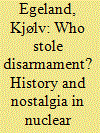

|
|
|
|
|
| Summary/Abstract |
Influential members of the disarmament community have in recent years maintained that further progress towards the international community's nominally shared goal of a world without nuclear weapons depends on recapturing the spirit and practices of cooperation that prevailed in the late 1980s and 1990s. Proponents of abolition, in this view, should focus their efforts on revitalizing the tried and tested arms control formula that was implemented following the end of the Cold War. In this article, I argue that this call to make disarmament great again reflects unwarranted nostalgia for a past that never was, fostering overconfidence in established approaches to the elimination of nuclear weapons. Far from putting the world on course to nuclear abolition, the end of the Cold War saw the legitimation of nuclear weapons as a hedge against ‘future uncertainties’ and entrenchment of the power structures that sustain the retention of nuclear armouries. By overselling past progress towards the elimination of nuclear arms, the nostalgic narrative of a lost abolitionist consensus is used to rationalize the existing nuclear order and delegitimize the pursuit of new approaches to elimination such as the movement to stigmatize nuclear weapons and the practice of nuclear deterrence.
|
|
|
|
|
|
|
|
|
|
|
|
|
|
|
|
|
|
|
|
|